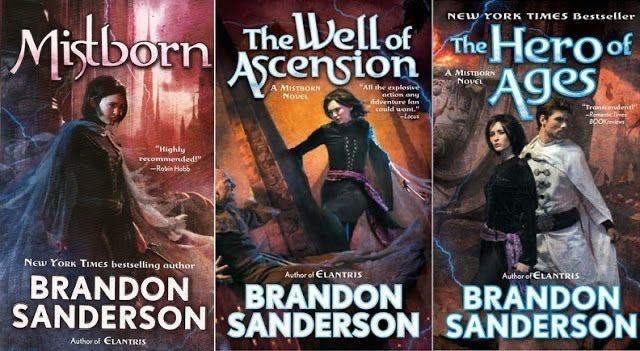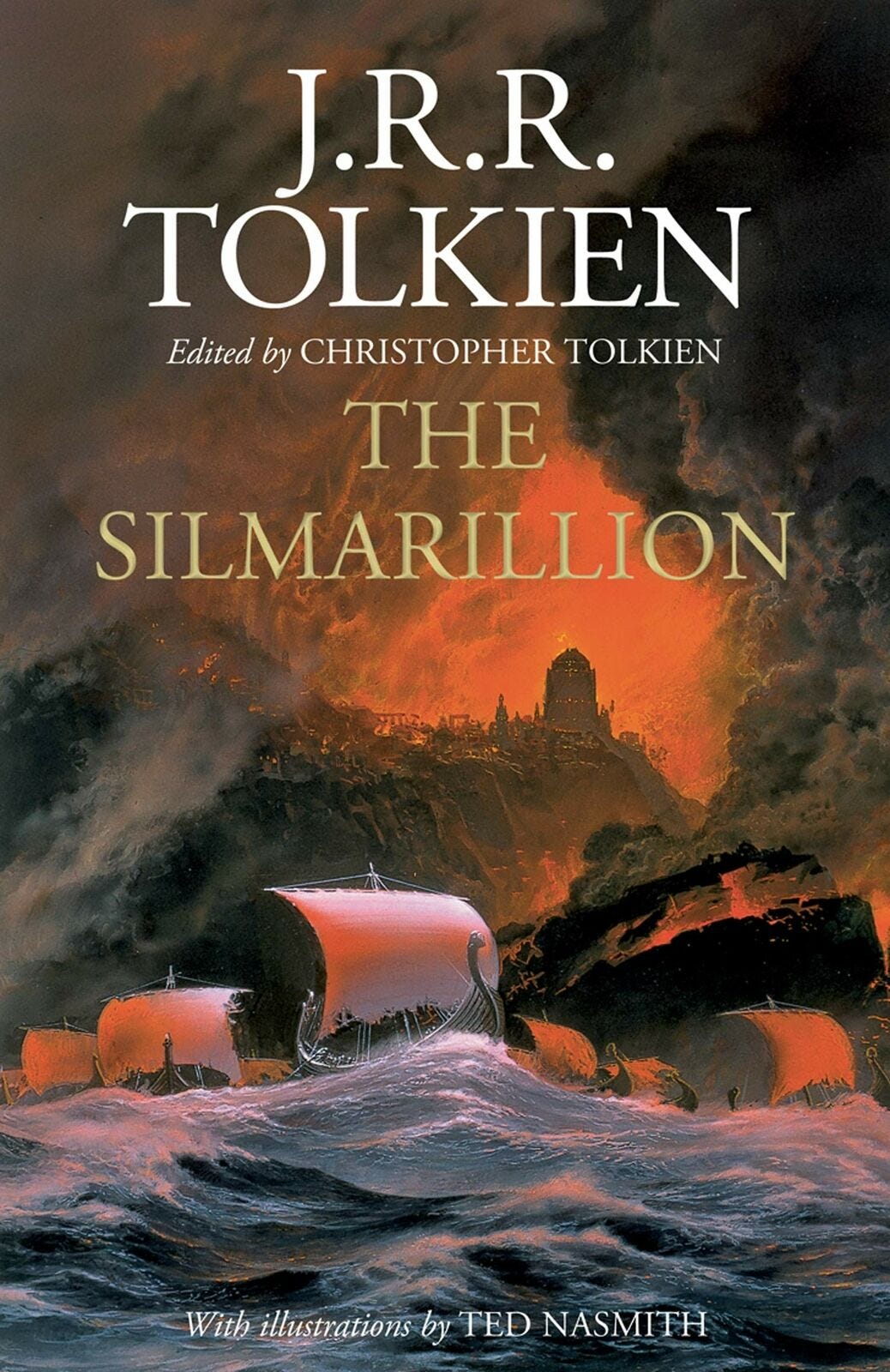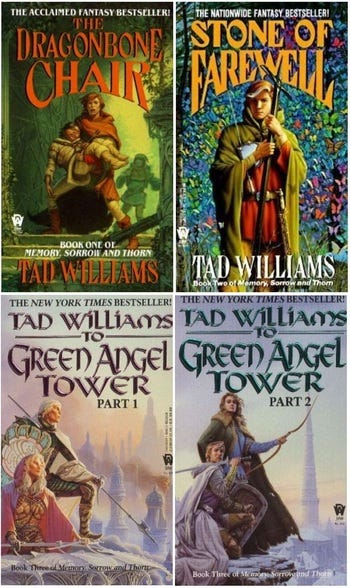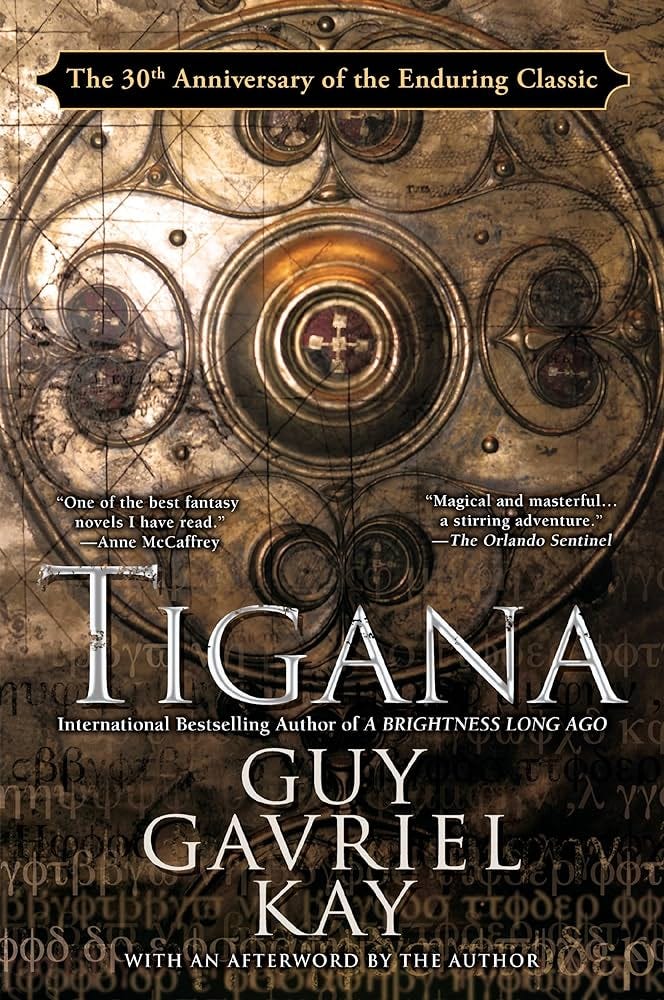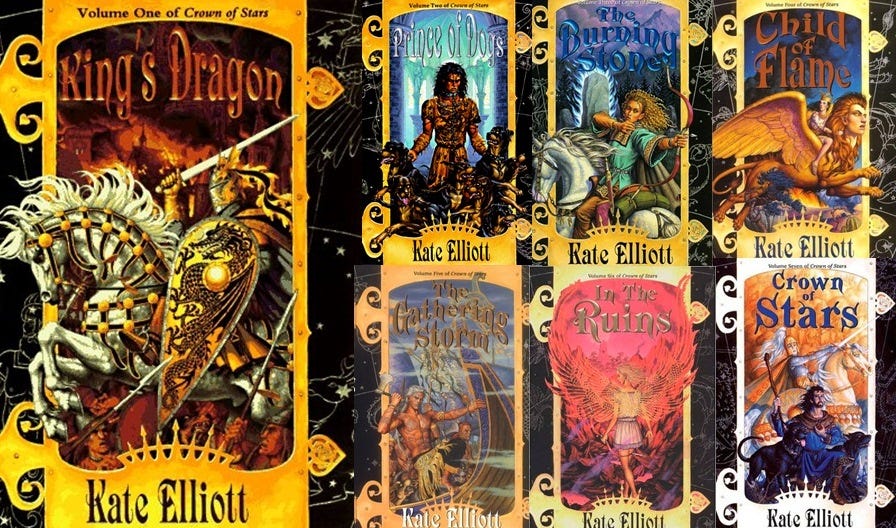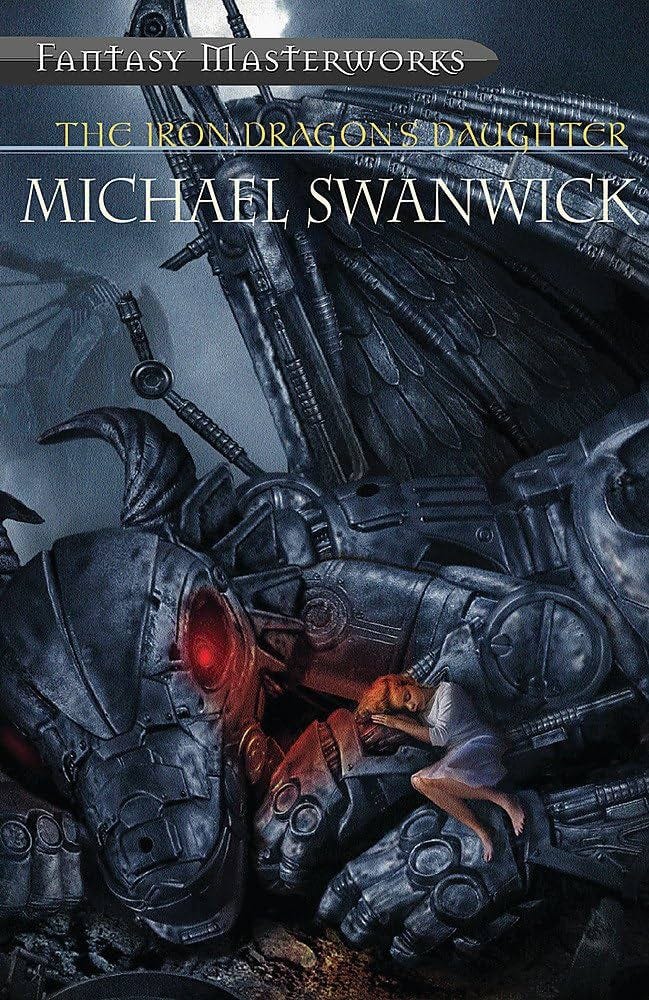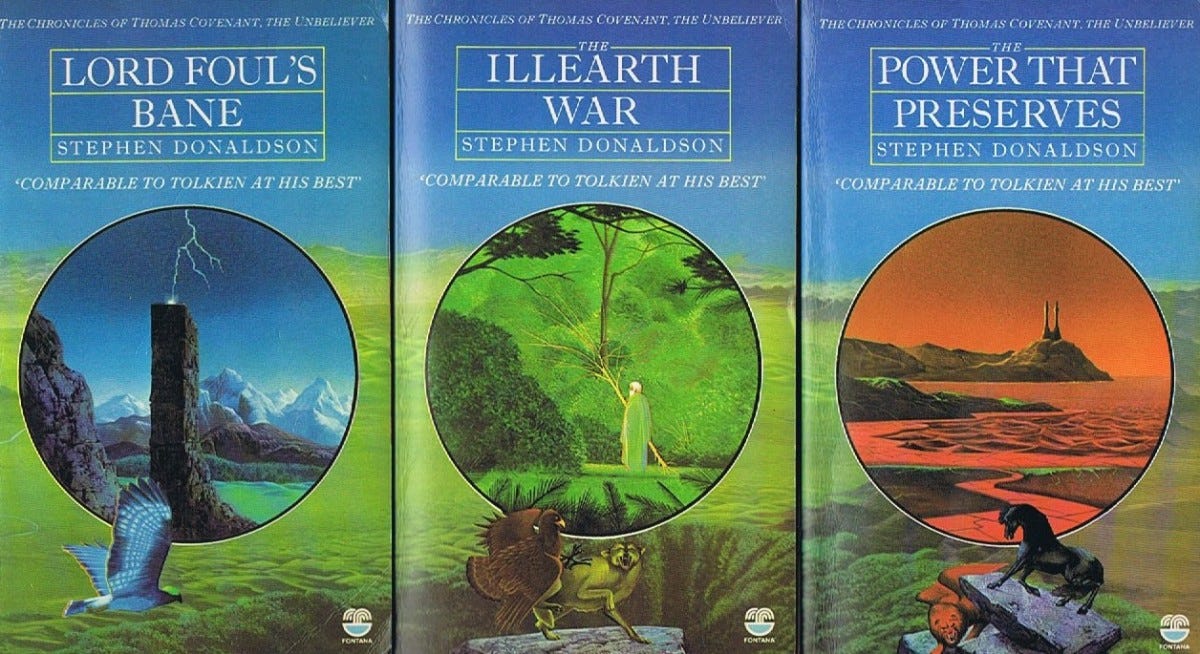Lord of the Rings: Recommended Reading
More of the Rings? Not exactly.
Jude: So this time we want to try giving some recommendations. If you liked Lord of the Rings, what else should you read? Now if you fire up Google, there’s lots and lots of people who have asked this question elsewhere. Typical answers seem to amount to “here’s a cool fantasy book I read”.
Thomas: I mean, the entire genre is downstream of Lord of the Rings, so that’s not unreasonable.
Jude: Maybe not, but I’d say that modern fantasy has evolved quite far from the Tolkien formula. There’s also now a substantial portion that grounded in different folklore traditions than Tolkien or in dialogue with other genres like romance. Anyway, you can find generic fantasy recommendations all over the Internet. We wanted to try to give something more targeted. If you really liked Lord of the Rings—
Thomas: You should read something totally different for a while and then come back and reread it. It’s all downhill from here.
Jude: That’s not very helpful.
Thomas: I think we just have to say at the outset, if you really, really like Lord of the Rings, the truth is it’s one of a kind.
Jude: That’s true of any great book.
Thomas: But it’s, uh, extra true here. Many have tried to crib from it, but no one had anything like Tolkien’s strange combination of talents.
Jude: Aside from Tolkien being a special snowflake, our theory of popularity is that really popular pieces of art are strongly appealing in multiple ways so different people can follow different paths to appreciating it. If you go looking for something that is appealing in all the ways Lord of the Rings is and to exactly the same degree, you’ll never find it. It’s like a fingerprint.
So instead, we’re going to try to break out some of the things that might appeal to you about Lord of the Rings and try to suggest novels that share that particular strength. Some of these will be prominent novels you’ve heard of and perhaps already read, but we’ll try to bring in some less common picks here as well.
In our first article about why Lord of the Rings is popular, we ran through many of its strengths. Probably we should start with the basics, though: it has a well-constructed plot in which people from diverse backgrounds in a secondary world work together to defeat evil. This is probably the aspect that has been most successfully copied.
Thomas: Certainly Star Wars did, right? And through that, you get everything Star Wars influenced.
Jude: Lots of people who read modern epic fantasy are reading it for plot first and foremost, so the blockbuster series you’ve probably already heard of are reasonable picks here, whether it’s Ursula K. LeGuin, George R. R. Martin, Robin Hobb, N.K. Jemisin, and so on. Each of those writers are amazing at one thing or another, but specifically for plot, I’d say Brandon Sanderson is the preeminent practitioner. His Mistborn trilogy is a good place to start.
Thomas: Just keep in mind going in that Sanderson earned his massive fanbase through great plotting…but also prodigious output. He’s a quantity over quality guy.
Jude: You’re going to make that massive fanbase hate us.
Thomas: I think even Sanderson would admit he doesn’t work hard to make each sentence into a polished jewel. And the characters are, uh, fine, but it’s not his strength either. And his video-game approach to magic—
Jude: Maybe “scientific” is a more charitable term.
Thomas: —is totally distinct from Tolkien’s vague and mystical magic. Some people love Sanderson’s rigor and some people can’t stand it.
Jude: We might do a series of articles on Sanderson at some point, so we won’t belabor this. But I think if you want a fantasy novel with a good plot, you won’t go too wrong sticking to the most well-known authors who get recommended all the time.
Now, one obvious way to get more Tolkien after reading Lord of the Rings is to just…read more Tolkien. If you haven’t read The Hobbit, it’s aimed at kids so it feels somewhat different, but it’s more hobbits and dwarves and Gandalf. And if you appreciate the deep lore and elevated language of the later parts of Lord of the Rings, well, The Silmarillion has got you covered.
Thomas: Just be aware there’s a reason we mentioned going to popular fantasy if you want plot before getting to Tolkien’s other work. The Silmarillion isn’t really a novel.
Jude: It’s a book of myths. There’s not much in the way of dialogue or even scenes, because it jumps from story to story and character to character. And while as the product of a single mind it’s much more thematically unified and consistent than, say, Greek myths, it’s a lot less so than Tolkien’s two actual novels.
Thomas: The important thing for people wanting more Tolkien to notice (since it’s intentionally obscured by publishers) is that Tolkien wrote and finished The Hobbit and The Lord of the Rings. That’s it, except for oddities like poems, essays, and a short story or two. The Silmarillion was assembled posthumously by his son Christopher Tolkien from extensive but contradictory drafts written at various times in his life.
Jude: Yeah, and in the last twenty years or so Christopher Tolkien has put out various short-ish stories that are sold as if they are novels. But really, for more of the Middle-earth drug, you have to tackle the The Silmarillion. It’s not quite popular enough to be a subject of our paired sequences, but maybe we’ll do a special post on the Silmarillion someday. There’s a lot of really fascinating aspects to it, but because it doesn’t have a narrative story the way Lord of the Rings does, it’s only for Tolkien die-hards.
What else? Well, for people who really do want Lord of the Rings all over again, but different, but not too different, for a while in the 80s and early 90s the fantasy genre did its best to produce this.
Thomas: And then stopped trying to do this because they clearly couldn’t.
Jude: Yes, but works from that era of the genre do have some of the qualities people might like in Lord of the Rings. Long trips, battles, dark lords, and so on. It’s been a while, but I’d say now what they didn’t have was Tolkien’s command of older forms of English, his deep affinity for landscape, his complex nostalgia, or his love of Scandinavian myth that, then and now, strikes most readers as similar but slightly alien to the folklore that directly fed into English-speaking culture. But you can still write a good story without any of those things, and using mythological traditions that are more squarely in the popular consciousness might even help in some ways.
Thomas: If these Tolkien remixes are so good, why haven’t we personally read any in, like, at least fifteen years?
Jude: We got it out of our system before that. Anyway, in sheer quantity Robert Jordan’s Wheel of Time has to be considered the winner, and that series does move into some unique places after a veryTolkien-derivative first book. It’s also very long, so if you like it, well, there’s a lot of it. There are some others that are decent. Guy Gavriel Kay actually briefly worked with Christopher Tolkien on the Silmarillion before writing Fionavar Tapestry, but he wrote his best novels later in a much less Tolkienian mode. David Eddings and his wife, alas, turned out to literally be child abusers, but they’re dead so won’t benefit from people reading books like the Belgariad. It’s cheesy and manages to take Tolkien’s orcs and make them more problematic, but otherwise it’s a breezy take on epic narratives.
Those are all decent, like I said, but back in 2010 when these things were much fresher on our mind, we felt that the best Tolkien remix was Tad Williams’ Memory, Sorrow, and Thorn trilogy. Williams at nearly all times writes very long books with a very slow pace, but unlike some other authors we could name, he finishes his projects and everything ends up feeling coherent.
Thomas: Full disclosure, we remember almost nothing about this trilogy. We liked it when we read it, but it hasn’t stuck with us, so I’m not sure we should be recommending it.
Jude: We’ve read an awful lot of books. “I’ve forgotten more good books than…” sounds like the start of a boast, but it’s actually a lament. And it’s also true. And it’s especially true of the fantasy novels from this era. We don’t remember any of them, so we’re going with some thoughts we wrote down back in 2010
Thomas: It might be worth mentioning, then, that Tad Williams later wrote a massive four-book science fiction epic, Otherland, that is also very long and slow, but which we enjoyed and remember a lot better than his fantasy novels.
Jude: True, but if I’m recommending something for someone who likes Tolkien—and I am—then I’ll stick with his original fantasy trilogy as our pick over other valid choices like Jordan, Kay, and Eddings. Plus Terry Brooks and Goodkind, whose reputations were already bad enough back then that we didn’t bother reading them, so who knows, maybe they’re actually good.
Thomas: Yeah, who knows, maybe we should read some old refrigerator manuals! We haven’t read those either, and you never know, maybe they’ll be a great fantasy in the tradition of Tolkien?
Jude: Yeah, yeah. All right, well, moving on, we’ve made a big deal about the role of nostalgia in Tolkien’s work and as a component of its popularity, but this theme was mostly dropped by the fantasy genre subsequently.
Thomas: We’re not historians but my sense is that genre fantasy is a sort of colony of genre science fiction. SF fans weren’t, and aren’t, the only people to read and love Lord of the Rings, but they were the ones who mustered enough demand for publishers to create a new marketing category. Those fans loved the novelty of Tolkien’s secondary world and found something in it’s connection with nature and folklore they weren’t getting from science fiction, but they had no use for the idea that the past was somehow better than the present and, especially, that the present was better than the future.
Jude: Yeah, that was discarded almost immediately. Often people preferred to imagine societies as existing in a technological or social stasis, or even use fantasy to dramatize social and technology progress, truly the antithesis of Tolkien’s attitudes.
Thomas: That’s because the fantasy genre grew up in the 80s and 90s when the popular culture was comparatively optimistic. In the last twenty years, pop culture has taken a really negative turn. “The world is awful” everyone wants to say now even though it’s really not markedly worse than in the 90s and probably better in most respects.
Jude: Given that, you’d think Tolkienian nostalgia for the past would be coming back into fashion, but if so, I haven’t really seen the evidence of it.
Thomas: Maybe our current culture is less nostalgic and more purely negative? It simultaneously sneers at Tolkien’s glorification of the past, seeing as the past was an era of slavery and tyrannical gender roles and so on, while simultaneously maintaining everything now is terrible. Instead of saying the past was great, people today prefer to talk about how much the future is going to suck. So we just have some depressing ecological fiction about New York City being underwater or scattered bands of people living in a desertified world.
Jude: Nevertheless, I wanted to recommend a book to people who feel like Tolkien’s attitude to the past resonates with them.
Thomas: I feel like there’s tons of such people, but very few of them will admit to it, so your effort is probably wasted.
Jude: Nevertheless, I wanted to recommend a book, and came up with one: Guy Gavriel Kay’s Tigana. We mentioned him already because he started his authorial career by writing a trilogy with strong Tolkien and Narnia influences. Later he would write a few excellent books and a lot of decent books that were all in his own unique style of fantasy that is almost, but not quite, historical fiction. Tigana was the transition point. There’s still a lot of magic and the supernatural, but the setting is clearly derived from pre-unification Italy.
So instead of one modern nation-state, there are nine “provinces” that are politically distinct despite strong linguistic and cultural similarities with each other, and antipathy between provinces has led the region to come under the influence or even outright rule of foreign powers. Before the book begins, the son of a very powerful foreign warlord is killed in a province called “Tigana” during its conquest. Enraged, the warlord casts a powerful spell that prevents anyone born outside pre-conquest Tigana from ever hearing its name. The survivors of Tigana must live with their homeland’s name wiped not just off the map but out of the minds of everyone they meet. The story follows efforts by some Tiganan patriots to defeat the warlord and reclaim their cultural heritage.
Thomas: It’s an interesting novel because on one hand Kay really wants you to be sympathetic to this cause and the characters’ love for their home, but you know in the back of your mind that Tigana as such doesn’t have much of a future regardless. These people are passionate patriots for the equivalent of the Principality of Piedmont. I guess for people living in northern Italy today, they might still have a sense for what that means and Piedmont must have made some cultural contribution to modern Italian culture…but how valuable is this, really?
Jude: But Tigana directly engages with those feelings. Tigana can never defend itself from foreign powers alone, so they know they’ll need to create the equivalent of Italy, and yet they feel conflicted about that. Meanwhile, the warlord who curses Tigana is not some demonic figure like Sauron. He’s a human being with emotions, relationships, and goals he considers laudable. He also knows, on some level, that his curse on Tigana was immature and self-sabotaging. So whereas Tolkien’s nostalgia is largely implicit, in Tigana it is explicit, but it’s deep in the fabric of both works, and both confront the necessity of accepting that what’s past is past and we have to live in the present and find a workable path to the future.
Thomas: So what’s next?
Jude: One of the many things that distinguish Tolkien was his understanding of medieval life. Most of the fantasy genre trades in cars and guns for horses and swords, but otherwise it takes thoroughly contemporary attitudes and doesn’t try to conjure the mindset of people who lived in the past.
Thomas: Contemporary books engage with contemporary ideas and are read by contemporary readers.
Jude: Sure, that’s why it’s very rare that Tolkien deviates so strongly from that. I don’t want to overstate it; as we’ve said, the Hobbit elements of Lord of the Rings are modernist and only seem less than contemporary to us because of our distance from Tolkien himself. But Tolkien spent so much time reading old texts that he had an unusual understanding of how people used to think and act, and that translates into a setting and characters that feel both authentic and slightly alien. So I wanted to recommend something else that really gets into that headspace for those who find it interesting.
The best book I’ve found for this was actually Michael Flynn’s Eifelheim, but that’s a science fiction story (first contact with aliens by a medieval village) that is just fundamentally different than Lord of the Rings, so instead I’ll recommend Kate Elliot’s Crown of Stars series that begins with King’s Dragon.
Thomas: First Tad Williams and now this. You’re really setting out to punish anyone who likes fiction to move at even a reasonable pace.
Jude: Yes, these books are also long and slow. But I think even more than Tolkien, Kate Elliot writes a secondary world with characters who really seem to inhabit a medieval mindset. Unlike Tolkien, who completely sidesteps religion and mostly avoids politics, Elliot’s series puts both front and center while still maintaining a heavy supernatural element throughout.
Thomas is right the series is very long. In tone and theme it’s pretty consistent, so if it it doesn’t click after one book, there’s no need to keep going. But if you like it, there’s a lot of it, and she takes things to some interesting place.s
Those are my picks, so that’s it for today. Next time we’ll—
Thomas: Wait, I want to make some recommendations too.
Jude: But…you don’t like anything.
Thomas: It’s all relative. You made your recommendations based on the idea that if someone likes Lord of the Rings, you should recommend them a book that—let’s face it—is probably worse but which has some small element that’s the same. I have an alternative methodology. We don’t tell someone who likes steak to eat three meals a day of nothing but steak. You need some contrast in life. Not only might you like, say, a salad with your steak on its own terms, but a good salad also helps you appreciate the steak.
Jude: I look forward to hearing what texts you think provide the maximum contrast is from Lord of the Rings. “17 Facts About Taylor Swift (you won’t believe #11)”? Advertising copy for suntan lotion?
Thomas: I didn’t say maximum contrast. Just sticking within genre fantasy, you could fill a bookstore with books that were written by authors specifically setting out to subvert, deconstruct, or refute some aspect of Lord of the Rings. I think it’s worth picking a few of the most interesting for people to consider.
Jude: Like what?
Thomas: Let’s start with Joe Abercrombie’s First Law trilogy.
Jude: I don’t think “grimdark” fantasy has aged well, has it?
Thomas: Maybe not, but that’s not why I’m recommending this.
Jude: I think it’s fallen far enough out of the discourse we have to explain what grimdark is for people who don’t know.
Thomas: Briefly, then, I’d say that grimdark was a reaction against the mostly bloodless fighting in Tolkien and his imitators. People die now and then, but most of the fighting has this stylized feel. In Peter Jackson’s movie adaptations of Lord of the Rings, the actors mostly just thwack orcs with nerf weapons and the extras fall over. That’s pretty true to how the books read.
The essence of grimdark was to say, no, fighting is not like that. Fighting is ugly, it’s gory, and it’s not all speeches and glory and victory. Tolkien knew that, of course, but he was writing for an audience that knew it too. Multiple generations of people had seen the horrors of war firsthand amid mass mobilization. War is farther from most of us.
Jude: That’s very charitable. I would have said that grimdark gloried in being more-violent-than-thou and rubbing the reader’s face in how “intense” and “realistic” everything is with long descriptions of blood, guts, excrement, violence, and sexual assault. It rooted its claims to authenticity in being literally disgusting.
Thomas: It’s weird that there’s such a fine line between being horrified by violence and exulting in it, but yes, a lot of fantasy fiction marketed to men from the mid-00s to the mid-10s was probably on the wrong side of the line. Abercrombie comes away looking better than most, I think. There’s a Tarantino influence there, sure, but he’s got a lot of other things on his mind besides violence and sex. That’s why I picked him, actually. George R. R. Martin famously complained that there wasn’t enough politics in Tolkien’s books, but we’ll deal with Martin some other time.
Abercrombie clearly sets out to pick apart the fundamental idealism of Tolkien, the belief that there’s good and bad, light and dark, and everyone agrees what they are. He wants us to admit the world is full of shades of gray. He does a good job making his case.
Jude: He’s wrong, at least as far as these books go, because the books would have you believe that ultimately everything happens because the people at the top are self-serving and exploitative. Taken to its proper conclusion (farther than Abercrombie does, of course) this is the logic of the paranoid conspiracy theorist who sees evil intent in everything that ever happens. Lots of the terrible things happen in world due to chance, or worse, because political leaders actually believe the ideals they preach.
Thomas: Fair enough, but readers can read this trilogy and decide for themselves. As a plus, if you like Abercrombie’s work here, he’s been remarkably consistent throughout his career. His follow-up novels are quite strong. He even wrote a good YA trilogy about post-apocalyptic vikings.
Jude: Yeah, he’s always worth reading, and that’s high praise from us.
Thomas: So if that’s a political response to Tolkien, next I want to cover a religious one with Jacqueline Carey’s two-book Sundering series. She’s better known for Kushiel’s Dart and its sequels, but here she clearly takes on Tolkien’s moral universe.
Jude: “What if Sauron was a good guy, actually?” So edgy. So brave.
Thomas: It’s a question worth asking! And while a couple different authors have done variations of this, I think Carey’s got the most interesting take. She does filter things through a somewhat more romantic lens than Tolkien, but it’s fun watching characters working for the not-actually-bad guys try to prevent kings returning, prophecies being fulfilled, and so on.
Jude: My only caution on this one is that to get the most out of it, you probably have to have read The Silmarillion, not just Lord of the Rings.
Thomas: Yeah, like I said, she goes straight for the religious assumptions behind Tolkien’s work. What is evil? What is good? The Silmarillion makes a lot of that explicit with its creation narrative.
Jude: At this point, is it still mind-bending to discover the guys who are supposed to be good are actually bad? This has been the “shocking twist” in thousands of novels, video games, TV shows, and movies at this point.
Thomas: I don’t think it’s a twist here. The twist version is that the protagonist amd the reader both assume they’re working for the good guys and discovers the truth along the way. Here, you have a Witch King-like figure named “Tanaros Blacksword” who has abandoned his mortality to serve the supernatural lord of “Darkhaven”. He chose to do that, so if anything, he thinks he’s working for the bad guys. But it’s pretty obvious what Carey is up to, so the fun is seeing how it plays out and how she sets up her contrasts with Tolkien’s angelic Valar and his dark lords Morgoth and Sauron.
Jude: Just 4,500 ratings on Goodreads, so you’re at least delivering on my promise to recommend some comparatively obscure books. So what’s next?
Thomas: Next up is Michael Swanwick’s The Iron Dragon’s Daughter. This is a book—
Jude: I can’t believe you of all people are recommending a book with an “X’s Daughter” title. You hate that crap.
Thomas: …yes, this title format is very lame. The most important thing about a woman isn’t who her parents are. But in this case it’s at least slightly redeemed by the fact the main character is not, in fact, the dragon’s daughter. It’s just a metaphor.
Anyway, the setup here is that a young girl gets kidnapped and taken to Faerie as a changeling. But instead of dancing around a faerie court, changelings in this world are put to work. In factories. Factories that build weapons for the military industrial complex. The titular “Iron Dragon” that she befriends is a dragon very much in the Tolkien tradition, a frighteningly intelligent and evil creature whose malign intellect wants to slaughter all living things. But it’s also, simultaneously, a constructed flying machine, a sort of magical jet fighter. The Fairyland factory where Jane is a child laborer constructs these demonic aircraft, binding them to the service of their buyers so they don’t just slaughter indiscriminately. The protagonist steals one and flies it away. Complications ensue. Lots and lots of complications.
Jude: This sounds suspiciously like steampunk. Does she have goggles and a big wrench?
Thomas: It’s a fantasy world that’s gone through the industrial revolution, but I’m recommending it here because I think even that quick description of the premise shows it’s deeply opposed to Tolkien’s reactionary tendencies while still using some of the same tropes.
Jude: Lots of fantasy these days is left-wing, but I should warn people that Iron Dragon’s Daughter is (unlike Tolkien, obviously) R-rated at minimum. It’s also very bleak. Not for the faint of heart. Since you’re willing to go this far and you’re trying to invert Tolkien’s politics, I’m surprised you didn’t pick China Miéville.
Thomas: Miéville is an actual communist, or at least he was, and at his best he’s even more inventive, but at all times he’s operating a lot farther from the Tolkien tradition. Swanwick says nice things about Tolkien and says he was mainly responding to the bland 80s knockoffs we talked about earlier, but I’d still say he’s responding directly at times to Tolkien while retaining some of his elements, like the dragon’s evil nature. And while it’s not always fun to read, it’s not actively unpleasant the way Mieville can be, or worse…
Jude: Worse? Why would anyone set out to read something “actively unpleasant”?
Thomas: Who knows? Some people only like comfort food, but some people like some bitterness in their food. So for people out there who want to truly go beyond the pale, I have one more recommendation.
Jude: Uh oh.
Thomas: If you want to really subvert Tolkien, you don’t go after his idealism or his politics or his notions of heroism. You attack the very idea of the existence of an escapist secondary world. You read Stephen R. Donaldson’s The Chronicles of Thomas Covenant.
Jude: Those books are an attack on the idea that a book should ever, at any point, be enjoyable to read.
Thomas: Donaldson is one of the few authors whose prose is as carefully atypical as Tolkien’s. Like Tolkien, he picks his words in order to produce an effect on the reader. But instead of producing a foreign but euphonious aspect like Tolkien does, he wants to make the reader feel unpleasant and unhappy.
Jude: And he succeeds. Look, my sense is that these books have mercifully become obscure over the last decade or so, and if they hadn’t, they would have been deservedly canceled. But when Thomas and I were coming of age in the 90s, these deeply unpleasant books had a real following. As did Beavis and Butthead, Limp Bizkit, and Jackass. Over two decades before Me Too, readers were abandoning Lord Foul’s Bane in disgust because of the main character’s shocking behavior toward women. The books might be too obscure now to be properly canceled, but you’re going to get us canceled by recommending them.
Thomas: There’s no way to sugarcoat this. At the very beginning of the first book, the protagonist rapes a woman. But—
Jude: How can there be a “but”?
Thomas: It’s not supposed to be a good thing! It’s supposed to be shocking and terrible. The guilt plagues the protagonist throughout the series. I’m not sure if I’d go so far as say the book centers the victim’s perspective—
Jude: Clearly it doesn’t. She’s not the protagonist.
Thomas: But it’s a weird situation, because she’s a vastly more sympathetic character than the protagonist. Most importantly, though, this serves an important artistic purpose. The central theme of the series, the thing that is more genuinely transgressive than thirty “grimdark” novels put together, is the rejection of reality. Thomas Covenant is a man who, for medical reasons, prides himself on his ability to stay in touch with reality at all times (he has leprosy and must visually monitor his numb extremities). He’s transported, Narnia-style, to an idyllic fantasy land where everything is wonderful, his leprosy is cured, and he has a heroic destiny that would normally makes everyone like him. His very sensible reaction is to think it’s a dream, a hallucination, a psychotic break. He concludes he’s trapped in a fake, imagined world and he must escape. And since it’s not real, nothing he does matters.
The reader’s sympathies are with the other characters. It’s a fantasy novel, so of course it’s not a dream! But…in one sense it really is fake: it’s just a story. No one actually suffers from what he does at the beginning of the book.
Jude: The reader suffers.
Thomas: Maybe so. But this is just a big list of recommendations, we definitely don’t have time to untangle the philosophy behind all of this. Most people aren’t going to read these books anyway. It’s been nearly fifty years since Donaldson’s first book was published and I say it’s still the preeminent rejection of Tolkien.
Jude: We reread a lot of books, don’t we?
Thomas: Yes.
Jude: We read this, what, at least twenty years ago?
Thomas: Yeah.
Jude: Have we reread it since then?
Thomas: Hell no.
Jude: I rest my case. Readers should keep your “endorsement” in mind.
Thomas: The Covenant books will challenge you. We still remember them after all these years because they grapple with problems that most fantasy doesn’t even touch.
Jude: All right, well, on that note, let’s get out of here before the mob finds their pitchforks. Next time we’ll talk about recommendations for people who like Dune.


